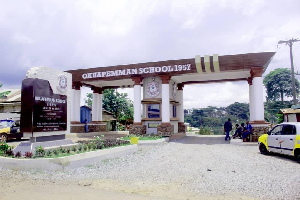General News of Tuesday, 16 March 1999
Source: --
Immunisation managers meeting opens
Accra (Greater Accra), 16 March '99 -
Mr Samuel Nuamah Donkor, Minister of Health, on Monday said research should be built into the implementation of the Expanded Programme on Immunisation (EPI). The minister, whose speech was read by Dr Emmanuel Mensah, Director of Institutional Care, at the opening of the first annual EPI managers meeting for West Africa said the research should allow for flexibility and adaptation to specific country needs. This can include how to improve or strengthen vaccine distribution and cold chain logistics, effective communication strategies and mechanisms for improving access and quality of care. Others are the economic and financial costs of the various EPI and immunisation programmes. The one-week meeting organised by the World Health Organisation (WHO) and the Ministry of Health (MOH) is being attended by 90 EPI managers from the Sub-Region and others from the donor community including Rotary International, USAID and UNICEF. They are discussing new and effective strategies to overcome the perennial problems of low coverage of EPI, enhancing social mobilisation, vaccine management improvement and injection of safety improvement. The EPI programme covers immunisation of children against the six killer diseases -- poliomyelitis, tetanus, measles, whooping cough, diphtheria and tuberculosis. Dr Peter Martin Mandara, WHO Representative in Ghana, regretted that though the target dates set for the elimination or eradication of certain diseases under the EPI programme are drawing near, there is still a lot to be done. For instance, surveillance has revealed that there is widespread transmission of polio though the date set for eradication is less than 22 months away. "Measles epidemics are rife in many localities while at the same time neonatal tetanus is still rampant in countries in the sub-region". Dr Mandara however said, with the assistance of the donor community, some successes have been achieved and called for more support and collaboration to achieve the set goals. Mr Sam Okudzeto, member of the African Regional Polio plus committee of Rotary International said the club has so far, committed more that 94 million dollars for polio eradication in Africa. He said the partnership of Rotary International with Ministries of Health in Africa and others like Japanese International Co-operation Agency (JICA) WHO, UNICEF Centre for Disease Control (CDC) is unique and pledged to continue its support for the eradication of polio in Africa.
Nigerian team understudy road fund board










